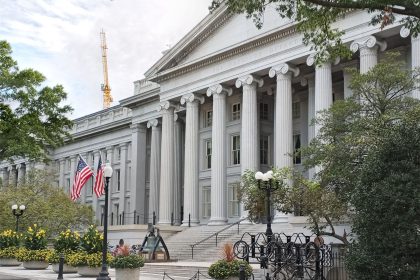GAO: Virus Relief Program Has Inadequate Safeguards; $1.4B in Relief Payments Sent to Dead People

WASHINGTON – Confronted with an extraordinary public health crisis, the federal government moved with uncommon agility to bolster the economy and quickly establish services for those infected with the virus, the nonpartisan Government Accountability Office said Thursday.
But in doing so it also sowed confusion, failed to build in adequate safeguards against fraud and sent nearly 1.1 million coronavirus relief payments totaling some $1.4 billion to dead people.
Thursday’s 403-page report, entitled “Opportunities to Improve Federal Response and Recovery Efforts,” puts the Treasury Department in a delicate position.
Though the government has asked relatives of the dead check recipients to send the money back, it’s not entirely clear they are legally obligated to do so.
In addition, the administration could be placed in a politically disastrous position if it is seen as aggressively trying to wrench back the money during the campaign season. This could be an especially thorny issue in the case of check recipients who may have died earlier this year of the coronavirus.
While the revelation of relief payments to the dead was the headline-grabber in the report, the GAO, which is Congress’ auditing authority, cited other serious problems.
First, it noted that federal spending data related to the four relief bills passed by Congress are not readily available because, under Office of Management and Budget guidance, federal agencies are not directed to report financial commitments and expenditures related to the coronavirus pandemic until July.
“It is unfortunate that the public will have waited more than four months since the enactment of the CARES Act for access to comprehensive obligation and expenditure information about the programs funded through these relief laws,” the report says.
In the absence of comprehensive data, the Government Accounting Office itself had to collect data from individual agencies, and the figures discussed in the report are current up to May 31, 2020.
For the six largest spending areas, GAO found obligations totaled $1.3 trillion and expenditures totaled $643 billion.
It attributed the majority of the difference to the Payroll Protection Program, for which the Small Business Administration obligated some $521 billion in the form of 4.6 million guaranteed loans through private lenders to small businesses adversely impacted by the pandemic.
The GAO noted the amounts for loan guarantees will not be considered expenditures until the loans are forgiven, and for those that are not forgiven, whether they are repaid in a timely fashion.
According to the auditor, while the Small Business Administration moved quickly to establish a new nationwide program, the pace “contributed to confusion and questions about the program and raised program integrity concerns.”
“First, borrowers and lenders raised a number of questions about the program and eligibility criteria,” the report says. “To address these concerns, SBA and the Department of the Treasury issued a number of interim final rules and several versions of responses to frequently asked questions. However, questions and confusion remained.
“Second, to help quickly disburse funds, SBA allowed lenders to rely on borrower certifications to determine borrowers’ eligibility, raising the potential for fraud.”
The accounting office said it has recommended that the SBA develop and implement plans to identify and respond to risks in the Paycheck Protection Program to ensure program integrity, achieve program effectiveness, and address potential fraud.
While the SBA has neither “agreed nor disagreed” with the finding, the GAO continues to believe adopting its recommendation is essential.
Next, the GAO turns to the subject of COVID-19 testing.
The auditor found that the Centers for Disease Control and Prevention reported incomplete and inconsistent data on viral testing from state and local health departments. That made it more difficult to track and mitigate infections and guide decisions about re-opening communities, the GAO said.
The report also highlighted the insufficient equipment and supplies in the Strategic National Stockpile to respond to the pandemic, as well as concerns expressed by state and local officials about the “distribution, acquisition and adequacy of supplies.”
While steps have been taken to meet the unprecedented need for information testing, the CDC reported data from different sources that have varied over time and haven’t been counting tests the same way, the GAO found.
For example, some states count the number of people tested while others count the number of samples tested — which could include several tests from one person — and some data didn’t distinguish between viral and antibody testing, the report said.
The Department of Health and Human Services issued guidance on June 4 that would help with data collection and reporting, and the CDC maintains it used the best testing data available, the report added.
The report then turns to three new, federally funded unemployment insurance programs created by the CARES Act.
As of May 2020, the states have received more than 42 million unemployment claims and the U.S. Department of Labor has taken steps to help states deal with the demand, the GAO said.
But, it noted, the Labor Department is still developing its approach to overseeing the new unemployment insurance programs.
“Further, the [unemployment insurance] program is generally intended to provide benefits to individuals who have lost their jobs; under [the Paycheck Protection Program], employers are generally required to retain or rehire employees for full loan forgiveness,” the report said.
“According to DOL, no mechanism currently exists that could capture information in real time about UI claimants who may receive wages paid from PPP loan proceeds.”
The GAO has recommended that the Labor Department, in consultation with SBA and Treasury, immediately provide help to state unemployment agencies that specifically address PPP loans, and the risk of improper payments associated with these loans.
The accounting office also decried the fact that despite its recommendation five years ago that a national aviation preparedness plan be made to reduce or prevent communicable disease outbreaks, no plan exists.
According to the report, the U.S. Department of Transportation agreed such a plan was needed, but then said the Departments of Health and Human Services and Homeland Security should lead the effort.
The GAO is recommending Congress take legislative action to require the Transportation Department to work with relevant agencies to finally develop a plan for safeguards to limit the spread of communicable disease threats from abroad.
Finally, in regard to the relief checks sent to the dead, the accounting office said the situation “highlights the importance of consistently using key safeguards in providing government assistance to individuals.”
“The IRS has access to the Social Security Administration’s full set of death records, but Treasury and its Bureau of the Fiscal Service, which distribute payments, do not,” the report said.
The GAO recommended that Congress provide Treasury with access to the Social Security Administration’s full set of death records, and require that Treasury consistently use it, to help reduce similar types of improper payments.
























